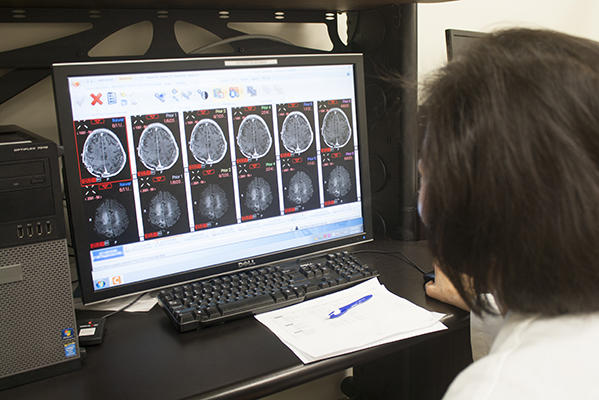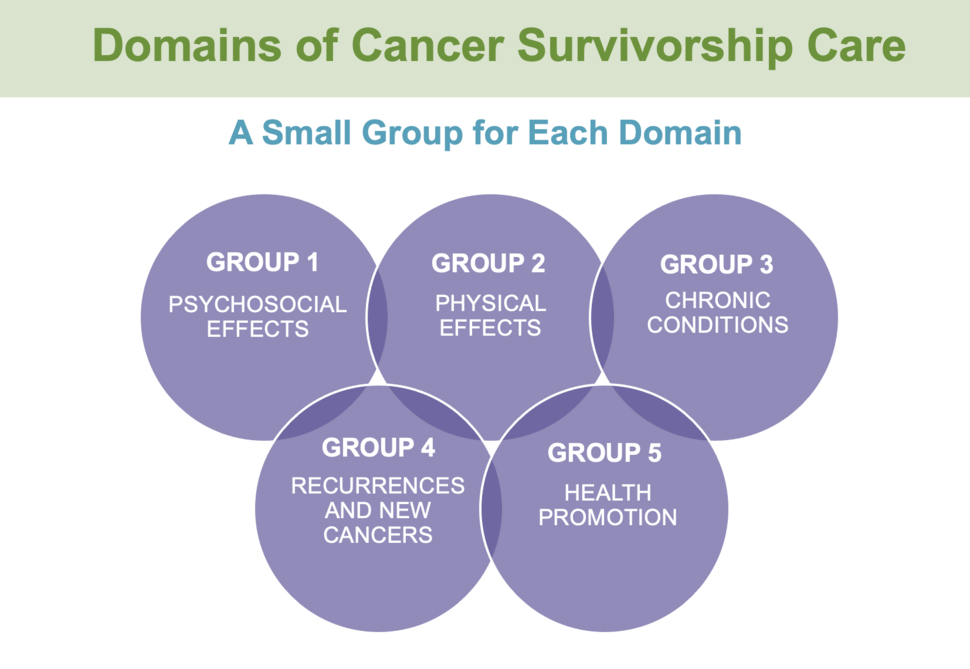Progress to Advance Care, Treatments, and Outcomes for Brain Tumor Patients
, by Brittany Cordeiro, NCI-CONNECT Program Manager
Read about our advances in care, treatments, and patient outcomes for brain and other central nervous systems tumors in honor of Brain Tumor Awareness Month.
An estimated 700,000 people in the United States are living with a brain tumor. Over 25,000 more will be diagnosed with a cancerous brain or other central nervous system (CNS) tumor this year. The causes are not known. And, while males are slightly more likely to develop brain cancer than females, brain tumors do not discriminate.
In May, the brain tumor community joins together to raise awareness about brain tumors through education. By sharing the rarity and uniqueness of brain and other CNS tumors—1.3 percent of all new cancers cases and over 130 different types—we can inspire research and clinical studies to improve diagnosis and standardize care.
We also hope to champion progress by sharing the work that NCI-CONNECT and the NCI Center for Cancer Research's Neuro-Oncology Branch (NOB) have completed over the last year to advance care, treatments, and patient outcomes.
Investigating New Therapies and Methods to Improve Outcomes
NCI-CONNECT Clinical Studies Expansion
In 2021, NCI-CONNECT expanded two clinical studies—an immunotherapy drug trial and a tumor tissue repository study—to its national network of collaborative institutions to reach more people with rare brain and spine tumors and help researchers advance their knowledge of the diseases faster.
The first-of-its-kind immunotherapy drug trial is designed to test whether stimulating the immune system using nivolumab is effective and can shrink (or control the growth or spread of) specific types of recurrent rare brain and spine tumors. The trial first launched in 2017 at the NOB. Now, the trial is being led by NOB Associate Research Physician Marta Penas-Prado, M.D. It is also testing the changes that nivolumab induces in immune cells in peripheral blood during treatment—and whether nivolumab can improve the symptoms of people with these tumors.
The new multi-institutional Tissue Outcomes Study collects tumor tissue and comprehensive clinical data from deceased patients with rare brain and spine tumors, and people who were pregnant at diagnosis (or became pregnant after diagnosis). The study is breaking silos by working across the NCI-CONNECT national network. It is led by Dr. Penas-Prado.
NCI-CONNECT First-in-Human Study
In other firsts, NCI-CONNECT launched a first-in-human phase 1 clinical trial for people with recurrent rare brain and spine tumors. Led by Brett Theeler, M.D., neurologist and neuro-oncologist in the United States Army Medical Corps and NCI-CONNECT clinical collaborator, the trial is studying ONC206, an oral cancer therapy. The trial tests the dosing and safety in adult patients.
NOB Immunotherapy and Glioblastoma Trial
Glioblastoma is the most common type of primary brain cancer. People with this disease or a variant called gliosarcoma have poor long-term outcomes. NOB Chief and NCI-CONNECT Co-Leader Mark Gilbert, M.D., is leading a new clinical trial testing an immunotherapy treatment to slow or stop the spread of cancer cells in people with glioblastoma and gliosarcoma. The trial will also evaluate a test that may help determine who is likely to get an immune response.
We designed the study based on quality science and built-in cutting-edge techniques. The study results should be a very important contribution to the field.
Outcomes Intervention Studies
Under the leadership of NOB Deputy Chief and NCI-CONNECT Co-Leader Terri Armstrong, Ph.D., NCI-CONNECT also launched three studies in 2021 to measure if an intervention helps improve outcomes. Led by Amanda King, Ph.D., an iCURE postdoctoral fellow in the Patient Outcomes Program, a virtual reality study for patients with brain cancer investigates if using a virtual reality headset to deliver relaxation techniques helps to reduce the distress and anxiety that people experience ahead of their magnetic resonance imaging (MRI) scans and clinical appointments.
Led by assistant investigator Dorela Shuboni-Mulligan, Ph.D., CRTA postdoctoral fellow in the Patient Outcomes Program, a sleep observation study measures daytime sleepiness and activity patterns using a smart wearable device. This will provide insight into the impact of sleep disturbance on those with brain cancers.
Led by assistant investigator Alvina Acquaye, psychosocial behavioral specialist for NCI-CONNECT, the CALM therapy intervention study uses individualized therapy to address negative feelings and improve a person’s mood and the way they feel. This study will determine if using the CALM intervention helps to reduce depressive symptoms in people with brain cancer.
Bringing the Community Together to Advance Science and Patient Care
Virtual educational webinars were held to join experts across disciplines with advocates—and provide forums for thoughtful discussion about challenges and solutions.
Targeting CNS Tumor Metabolism
To advance the field of CNS tumor metabolism, NOB Investigator Mioara Larion, Ph.D., and Dr. Gilbert co-led a virtual symposium with the Society for Neuro-Oncology (SNO) on April 6-7, 2021. It was the first conference entirely dedicated to education and research on brain tumor metabolism. Over 500 people registered to attend. The conference brought together clinicians, researchers, trainees, patients, and experts in the field of metabolism.
Survivorship Care in Neuro-Oncology Symposium
NOB Assistant Research Physician Heather Leeper, M.D., and Dr. Armstrong co-led the Survivorship Care in Neuro-Oncology Symposium on June 21-22, 2021. The symposium brought together neuro-oncology providers, researchers, advocates, patients, and care partners virtually to learn, discuss the challenges experienced by people living with brain and spine tumors, and develop survivorship care guidelines. Over 250 people attended the symposium.
Introduction to Career Pathways in Neuro-Oncology
On January 11, 2022, the NOB partnered with SNO to offer trainees of all disciplines the opportunity to learn about neuro-oncology careers in basic science, clinical care, and research. The free virtual event offered insights, opportunities, and strategies shared by world-renowned neuro-oncology professionals to expand a neuro-oncology career. There was also a post-session panel discussion for attendees to share their thoughts with experts.
NIH Tumor Boards and Journal Clubs
To encourage referrals and further collaboration, in 2020 we expanded our virtual journal club and weekly multidisciplinary NIH Neuro-Oncology Tumor Board live sessions to include investigators and cases from participating NCI-CONNECT consortium sites. As of November 2021, 28 providers had presented 41 cases at 24 tumor board meetings with 60 to 70 participants.
Awarding and Recognizing Pioneering Work
National Research Awards
In 2021, Lasker Clinical Research Scholar and NOB Investigator Jing Wu, M.D., Ph.D., was accepted into the NExT (NCI Experimental Therapeutics) Program, which provides resources for projects focused on developing therapies for unmet needs. Dr. Wu leads the NOB Translational Research Program, which is dedicated to developing clinical trials for people living with brain and spine tumors. Her work combines both clinical and laboratory research and is making a difference in the field.
Dr. Penas-Prado received an Award for Excellence in Rare CNS Disease at the 2021 SNO Annual Meeting for her abstract on the interim analysis of the immune checkpoint inhibitor nivolumab for people with rare CNS cancers trial. As of March 10, 2021, the interim analysis of the clinical trial determined that the disease control rate exceeded the minimum required to pass the interim analysis in the heavily pretreated cohort and continue the trial.
Ultimately, this multicenter study should advance our understanding of these tumors, set the foundation for future trials, and provide better treatment options.
Dr. Penas-Prado also received the 2022 Center for Cancer Research Staff Clinician Leadership Merit Award for leading our rare CNS tumor clinic and clinical trials, a national tumor board, and an international symposium.
Dr. Leeper received an Award for Excellence in Survivorship at the 2021 SNO Annual Meeting for her abstract with the NOB Patient Outcomes Program on whether economic strain and mood disturbance during the COVID-19 pandemic may have additional impacts on patients’ symptoms and function. Dr. Leeper concluded that worse financial toxicity scores were strongly associated with worse overall symptom burden, worse anxiety and depression scores, and worse overall health-related quality of life scores.
Trainee and Mentor Awards
Postbaccalaureate Research Fellow Yeonju Kim was selected as the Outstanding Post-Graduate Trainee at the 22nd Annual Center for Cancer Research Fellows and Young Investigators Colloquium, where she gave an oral presentation. Kim is mentored by NOB Staff Scientist Orieta Celiku, Ph.D., Dr. Gilbert, and Dr. Armstrong. Her colloquium abstract was titled, "ACROSS: Accrual and Access to Neuro-Oncology trials in the United States."
Dr. Celiku received the 2022 NCI Staff Scientists and Staff Clinicians Outstanding Mentor Award for her exemplary mentorship in developing the next generation of cancer researchers.
Sharing Progress to Raise Awareness
The NOB and NCI-CONNECT published over 80 abstracts that were presented at national meetings, one journal supplement, and 10 manuscripts. Our work modified two National Comprehensive Cancer Network (NCCN) guidelines for rare CNS tumors in 2020 and 2021. Our progress is made possible by the participation of patients and their care partners in our programs.
To continue our efforts in brain and spine tumor care, treatment, and research—and to improve survival and quality of life for people living with the disease—we encourage you to join us for Brain Tumor Awareness Month in May and share these advances. Educating those living with (or not yet diagnosed with) a brain or spine tumor can make an impact.

